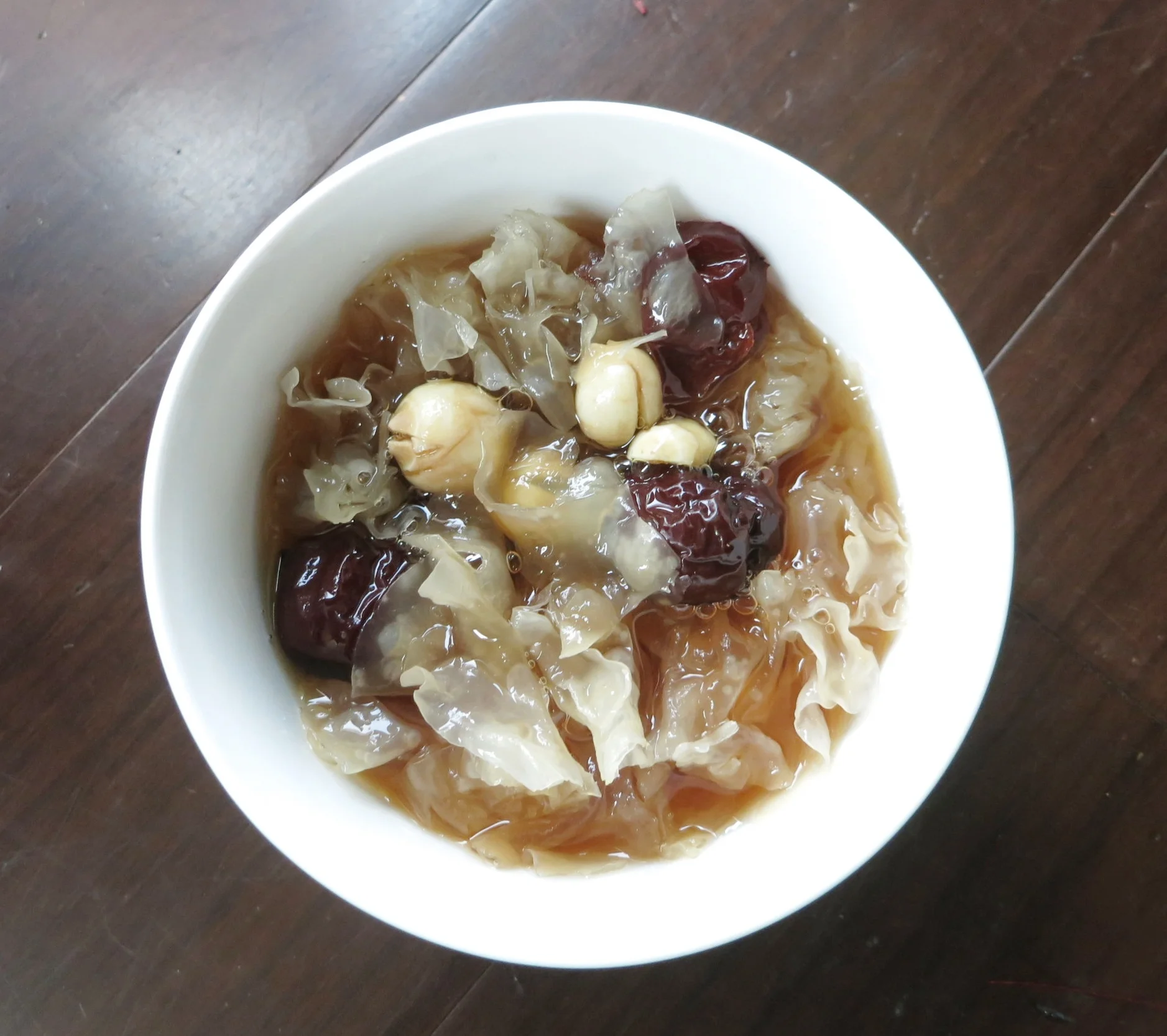White Wood Ear and Lotus Seed Soup Recipe
/Chinese herbal sweet soup is part of Chinese dietary therapy. By drinking herbal soup regularly, we can take advantage of the special herbs to enhance health and prevent disease. One popular sweet soup is Yin Er Lian Zi Tang, or the White Wood Ear and Lotus Seed soup.
Dry herbs of white wood ear, red date, and lotus seed.
After cooking. The White Wood Ear turns translucent and jelly like.
White Wood Ear (Bai Mu Er)
White Wood Ear is a funny translation of the herbal name. Wood Ear (Mu Er in Chinese), is a type of fungus that is like super food full of nutrition. There is a Black Wood Ear (Hei Mu Er) that is usually cooked in savory dishes, and the White Wood Ear (Bai Mu Er) is usually cook as sweet soup for dessert.
White Wood Ear usually comes in a dry form from a herbal store. You can soak it in cold water until it is soft. It might take half hour or longer, depending on how dry it is. Once it softens, it is easy to cook with other ingredients.
The function of White Wood Ear is nourishing Yin, generate fluid and moisten the Lung. Great for Lung heat with a dry cough and scanty sputum that is difficult to expectorate.
Lotus Seed (Lian Zi)
Lian Zi often comes in dry form too. It should be soaked in water to rehydrate like Wood Ear. If you can find the fresh one, you can skip soaking.
The Seed of Lian Zi is pretty bitter. Many people prefer taking out the seed part before cooking. The bitterness is more effective in calming the spirit in Chinese medicine. So it is your decision to take out the seed or not.
Lian Zi nourishes Spleen and Kidney, calms the spirit. Great for anxiety, insomnia, irritability, diarrhea, and Leukorrhea.
Other ingredients
There are endless variations of this sweet soup. You can add Da Zao (red date), Go Ji Zi, Bai He, or Lotus root. They can be combined or skipped according to the availability and function you like to enhance.
Da Zao, or Hong Zao (red date)
Chinese Da Zao is a very popular ingredient in many dishes. It is sweet and warm, enters Spleen and Stomach. It tonifies Qi and reduces side effects of herbal formulas.
Da Zao should be pitted and soaked for easy cooking. The seed inside Da Zao is too hard to chew. Some Da Zao comes with pits and some are already pitted.
Go Qi Zi, or Goji berry (Wolfberry)
It has become a super food in the western society. The bright orange berry is beneficial for eyes, Liver and Kidney. Add hot water to Go Qi Zi to make quick tea for daily drink. You can eat Go Qi Zi directly but most people prefer to add them in water for a softer texture. It tastes sweet and makes any dish colorful.
Bai He (Lily Bulb)
Another Chinese herb to nourish Yin, calms the spirit and harmonize middle jiao (spleen and stomach). Bai He is very popular in sweet Chinese herbal soup. Most Bai He needs to be rehydrated by soaking in water first, unless you find it fresh in the market.
Lotus Root (Oh Jie)
Lotus root has a similar function to Lian Zi (Lotus Seed) and great for calming the spirit. Sometimes fresh Lotus Roots are available in the Asian market. Slice it into pieces and it shows the interesting pattern from the empty spaces inside the root.
Cooking together
After ingredients are rehydrated, pitted, and sliced, put together in a pot with water (at least cover the herbs) and simmer for 15 to 20 minutes.
Sweetener
Add some rock sugar or brown sugar as desired at the end of cooking. The soup tastes fine without sugar, but a little bit of healthy sugar does not hurt.
That is it. Not difficult at all. It makes a better dessert choice than chocolate cookie or cakes. People from Hong Kong are the firm believer of herbal soups. They are anti-aging, good for skin and overall health. Remember to rehydrate the herbs first if it comes dry, or it might be difficult to cook through and too tough to chew. Don't worry if you do not have all ingredients. Be flexible and use what you can find. Herbal soups are generally safe, but If you have concerns or specific health problems, always consult a qualified herbalist first.
Store bought White Wood Ear and Red Yi Ren Soup.














What should we eat in the fall season to fight against dryness, allergy, cold and flu?